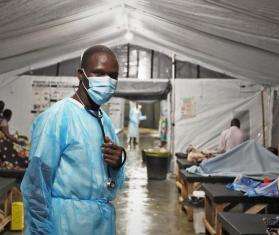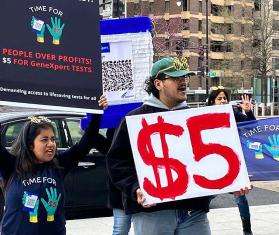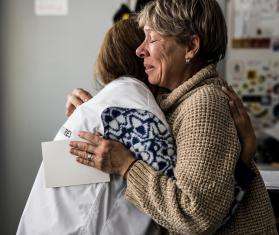By Thierry Allafort-Duverger, general director of the French section of Doctors Without Borders/Médecins Sans Frontières (MSF). A version of this article originally appeared in Le Monde on November 30. This article has been translated from French.
Five days ago, a team from my organization, MSF, carried out medical consultations for about 100 men and women in a detention center in Libya's Misrata region.
The detainees had been taken to the center after Libyan coast guards intercepted their boat in the Mediterranean. Despite our medical work in Libyan detention centers, we do not know what happens to people after we see them—our patients can disappear from one week to the next without a trace.
Since this summer, the Libyan coast guard has stepped up its interceptions at sea with the support of the European Union and its member states, particularly France and Italy. Libya is more than ever a trap for people hoping to work there or crossing the country to seek refuge or a brighter future in Europe.
A shocking report by CNN on November 14 shed light on a situation long denounced by many organizations: a lucrative business of abduction, torture, and extortion of migrants and refugees in Libya, where they are reduced to merchandise—a system that is actually encouraged by European policies that focus on containing migration at any price.
The news broadcast of slaves being sold did prompt some political reactions, as France condemned a "crime against humanity" and demanded an emergency session of the U.N. Security Council.
But what can we think of those who, like Emmanuel Macron, name and condemn what is happening in Libya while continuing to support Libya's coast guard and fund other measures that return and keep people in the hell they are trying to escape? This is the height of hypocrisy. Who can still pretend that men, women, and children who are taken from intercepted boats and returned to Libya are kept in comfortable, freshly painted welcome centers fixed up to "international standards," thanks to the generosity of European taxpayers? On the ground in Libya, there is no doubt that they are returned to an extremely violent environment, where the boundaries between the authorities and the networks of human traffickers are blurred.
In Libya, we recognize the limits of MSF's own ability to act in the detention centers. Our doctors do not have unimpeded access to the detainees and are not free to decide who to examine or to treat. Sometimes certain detainees are kept hidden so that our teams cannot help them. Pretending that money alone will improve conditions in Libyan detention centers is a sham. The relevant agencies, such as the International Organization for Migration (IOM) and the U.N. High Commissioner for Refugees (UNHCR), have only an extremely limited presence on the ground, as do other U.N. agencies and diplomats.
To what extent does MSF's presence in the detention centers cast a veneer of humanity over a brutal system? This is a dilemma that we try to overcome by constantly considering our ability to provide vital aid to people in distress and to bear witness so that the full violence and inhumanity of their situation are known.
There is no easy solution, but for political leaders to express outrage at the crimes against migrants in Libya while pursuing an overt policy to return and keep as many as possible on that side of the Mediterranean is, at the very least, shameful.
The contradictions of this approach are becoming more apparent. In October, the number of migrants held in Libya's official detention centers tripled, according to estimates provided by the IOM and the Department of Combating Illegal Migration, the agency that runs the centers.
U.N. human rights observers were shocked by what they saw in detention centers in Tripoli in early November: thousands of emaciated and traumatized people piled on top of each other, locked inside storage areas and subjected to extreme violence and abuse. On November 14, Mr. Zeid Ra'ad Al Hussein, the U.N. High Commissioner for Human Rights, declared that since the European Union stepped up its interventions to stem migration, monitoring has shown a deterioration in the already deplorable conditions of detention of migrants and refugees in Libya.
What is Mr. Macron hoping to achieve with his recent call for military and policing action in Libya to dismantle smuggling networks? Another foreign military intervention will serve only to fuel the conflict in Libya, where no authority has a monopoly on violence. Fighting smugglers without providing safe and legal ways for people to move and flee will not resolve the problem. Beyond token gestures, what is urgently needed is a real change in European migration policies. While actions must be taken to reduce the suffering of those living this hell, above all there must be an immediate end to policies that add to their misery.
We once again urge the European Union—particularly France and Italy, which have a key role—to facilitate search and rescue operations at sea and stop supporting coast guards who are intercepting and returning migrants and refugees attempting to flee Libya, which is not even a signatory to the Refugee Convention. If not, France will fall further into complicity for the very crimes that it condemns.
France made a positive step in Niger through the French Office for the Protection of Refugees and Stateless Persons, known as OFPRA. This will allow some refugees to be granted asylum in France without a dangerous journey. In other cases, it will help survivors of the migration route, such as 25 individuals recently evacuated from Libya to Niger by UNHCR.
No one yet knows how many people will benefit from this initiative, but it will make only a small difference—a drop of water in a larger crisis, like what MSF is managing to achieve in Libya. And what fate awaits all those who have suffered the worst but are not eligible for refugee status?
It is necessary to give all those stuck in the Libyan trap, which is partly woven by France and the European Union, the opportunity to escape. This means the full application of the right of asylum for those who are eligible and helping to return those who truly want to go back to their country of origin. In neighboring countries, France, and elsewhere in Europe, there must also be efforts to protect and meet the needs of the survivors of this hell on earth.
MSF has worked in Libya since 2011. Since June 2016, MSF has provided medical care to migrants and refugees in detention centers in the Tripoli and Misrata regions.




